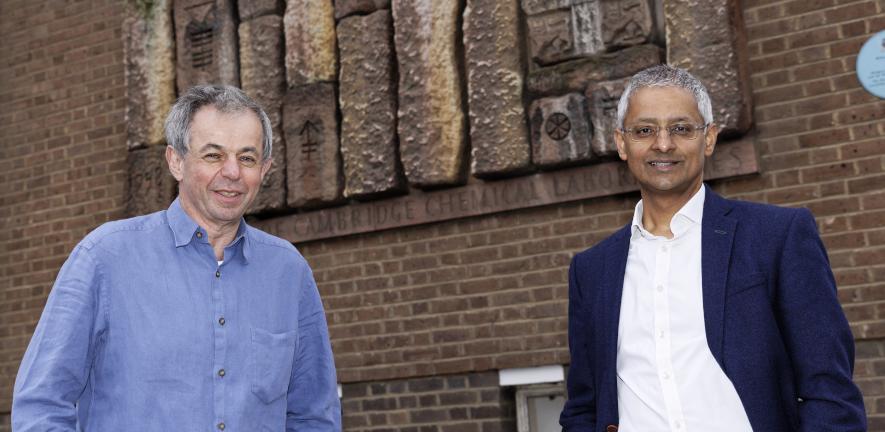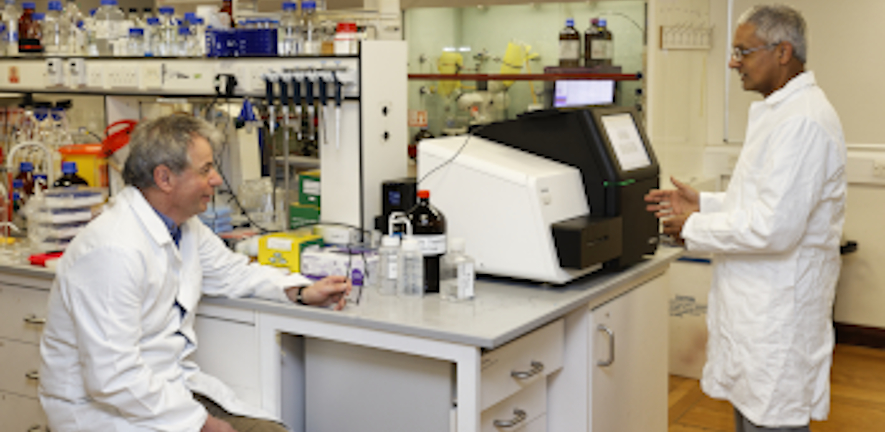
Balasubramanian and Klenerman co-invented the Solexa-Illumina Next Generation DNA sequencing (NGS) technology that enabled fast, accurate, low-cost and large-scale genome sequencing. The technology transformed the fields of genomics, medicine and biology, and has led to a million-fold improvement in the speed and cost of DNA sequencing.
The Millennium Technology Prize is one of the world's most prestigious science and technology prizes. The global award, worth €1 million, is presented every second year in honour of a pioneering technological innovation that has extensive positive social impacts, is commercially viable and promotes the welfare of humanity.
NGS technology has revolutionised global biological and biomedical research. In 2000, sequencing of one human genome took over ten years and cost more than a billion dollars. Balasubramanian and Klenerman's brilliant idea (famously formed at The Panton Arms near the Chemistry building) was to create a method that could sequence billions of fragments in a parallel fashion, making the technique fast, accurate and cost-efficient. Today the human genome can be sequenced in one day at a cost of $1,000, and more than a million human genomes are sequenced at scale each year.

Watch a video produced by the University of Cambridge about NGS sequencing.
NGS has been widely adopted in healthcare and diagnostics in areas such as cancer, infectious medicine and prenatal testing. It is increasingly used to define the genetic-risk genes for patients with a rare disease and to identify new therapies for common diseases. NGS has also contributed to the creation of new and powerful biological therapies like antibodies and gene therapies.
The Millennium Technology Prize is awarded by Technology Academy Finland. Academy Professor Päivi Törmä, Chair of the Selection Committee, said: “The future potential of NGS is enormous and the exploitation of the technology is still in its infancy. The technology will be a crucial element in promoting sustainable development through personalisation of medicine, understanding and fighting killer diseases, and hence improving the quality of life. Professor Balasubramanian and Professor Klenerman are worthy winners of the prize.”
Most recently, NGS technology has proved invaluable in helping scientists and researchers sequence the SARS-CoV-2 virus. This knowledge has been crucial in the development of effective vaccines and in unraveling why immune responses to the virus are so varied.
Professor Marja Makarow, Chair of Technology Academy Finland said: “The technology pioneered by Professor Balasubramanian and Professor Klenerman has also played a key role in helping discover the coronavirus’s sequence, which in turn enabled the creation of the vaccines – itself a triumph for cross-border collaboration – and helped identify new variants of COVID-19.”
This is the first time that the prize has been awarded to more than one recipient for the same innovation, celebrating the significance of collaboration. In a joint statement, Balasubramanian and Klenerman said:
“We are delighted and honoured to be the tenth recipients of the Millennium Technology Prize. This is the first time we've received an international prize that recognises our contribution to developing the technology – but it's not just for us, it's for the whole team that played a key role in the development of the technology and for all those that have inspired us on our journey.”
Professors Balasubramanian and Klenerman will deliver the Millennium Technology Prize Lecture on 19 May 2021, at 14:30hrs (BST) at the Millennium Innovation Forum.
For further information, visit the University of Cambridge website.

